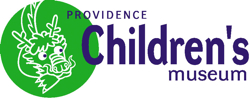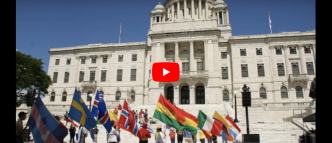
By Cathy Saunders
Director of Education
Three years ago, Providence Children’s Museum was selected as one of nine sites across the country to join the National Partnership for After School Science (NPASS), a pilot project funded by the National Science Foundation to improve training for after-school providers. We’ve had a blast working with nine after-school programs to build rubber-band-powered cars, explore dry ice, wire a toy house with lights that turn on and off, and more. As the Museum’s director of education, I’ve learned a tremendous amount that has implications not only for after-school programming but for school and museum programs and parents as well.
Our approach to this project is that you don’t have to be a scientist or a teacher to teach science; you just have to be curious, excited, and willing to give kids some materials to work with. I don’t always feel confident in my knowledge of scientific principles, but I am sure of my ability to facilitate science learning. I provide opportunities for “tinkering,” problem-solving, experimenting, question-asking, and working with others. I know we’ll learn more than we knew before, even if I can’t always predict what it will be.
“What did you notice?” has become our most frequent question. Observing details is a learned skill, one you can encourage by asking open-ended questions that prompt children to use their five senses. To answer these questions, children use descriptive language that forms a foundation for their science vocabulary. Their observations are evidence they can use to design tests to answer their own questions.
Children often want to give what they think is the right answer. They may look to you for approval or make things up based on prior knowledge. Remind them to talk about the current experience by using other questions to keep them on track: “What happened?” “What did you do then?” “What changed?” “What will you try next?”
The hardest part for adults is to embrace children’s discoveries and exploration. This is another skill we can learn. When a child asks me a question, I pretend I don’t know the answer (which is often true) and I turn it back to her: “Well, what have you noticed?” “I don’t know, can you think of a way to test that?” I have to remind myself that it’s okay if a child tapes the wrong things together the first time. He’ll learn more if I let him experiment and make discoveries on his own.
You can practice science facilitation skills with simple activities at home and when exploring Providence Children’s Museum. Hands-on exhibits like Water Ways, Iway, and Shape Space provide opportunities for conversation as you and your child construct fountains, design bridges, and build amazing block structures. In May, check out programs like Block Party, Splash Science, and FETCH!™ Lab, and investigate the Wonderful World of Worms. Remember to ask questions as you examine the world around you and solve problems together!
News and Notes from Providence Children’s Museum: Occasional posts about things to do with our kids – from places to go, things to make, ideas to think about, and ways to explore. Providence Children’s Museum – 100 South Street, Providence, RI. 401-273-5437 (KIDS).








